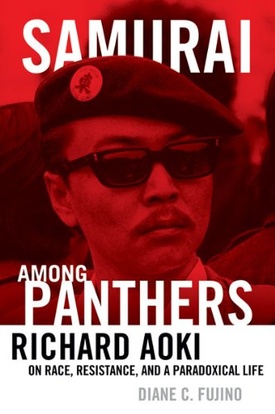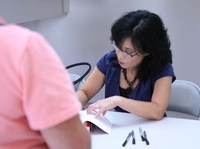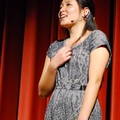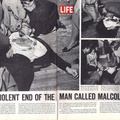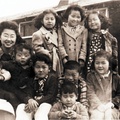Best known for his dedication to the Black Panther Party, his leadership in the Asian American Movement as one of the founding members of the Asian American Political Alliance, and as a pivotal figure in the Third World Liberation Front, Richard Aoki was one of a kind. Diane Fujino’s book, Samurai Among Panthers: Richard Aoki, On Race, Resistance, and a Paradoxical Life, explores the passionate, revolutionary, and often complex life of Bay Area activist Richard Aoki. In an interview earlier this year, Diane elaborates on the life of Richard Aoki and her journey through the production of his biography.
Seeing how the “political and personal intersect,” Diane was thoroughly interested in the complete picture of Richard’s life, much more than what he had even revealed to his close friends and fellow activists. While uncovering the facts surrounding a person’s life, sometimes you need that extra interpretation and a comprehensive overview to understand the context and reasons behind a person’s actions, which is exactly what Diane accomplishes.
Richard’s story, Diane stated, “really broadens and complicates our understanding of Japanese American history.” This, in turn, also emphasizes the many different identities within the Japanese American community and its multidimensionality. Richard seems to fit the standard narrative in which, Diane said, “people rose up and gained upward mobility…but he also contests it because of the ways he engaged in this radical protest.”
During World War II, he and his family were imprisoned at the Topaz concentration camp in Utah, where his parents split up and Richard recalls his first fistfight with a bully on his block. Diane said, “[Richard’s] story really contests the idea that camps were fine for the kids.”
Furthermore, during his activist life, Richard brought a progressively unique approach to the early Asian American Movement, in which Diane described as “a real militancy, kind of a street focus, and Afro-Asian radicalism.” She describes how he carried with him the Bushido code, or the Way of the Warrior by Nitobe, which emphasizes honor through a sense of duty and self-sacrifice. He lived his life in honor of this code, as a warrior-scholar, well educated and versed in social and political constructs and with his militant attitude, wasn’t afraid to put his life on the line for the causes he was most passionate about.
Among these issues were Asian American social and political rights, the Black Power Movement, and the Third World Strike, in which he played an instrumental role as a devout advocate and one of the first Asian American Studies coordinators and instructors at Berkeley. He fought for, in Diane’s words, “radical transformation of education” and its integration into the community. There was always something to fight for and people to help in his eyes and he became involved in a variety of social and political organizations. Diane stated, “Richard’s solidarity was international.”
After an exhaustive activism career, working-class and minority students became Richard’s main priority. As a counselor, instructor, and administrator for the community college system, he pushed his students to pursue higher education and advocated for the students’ protection, defending his students in court when needed.
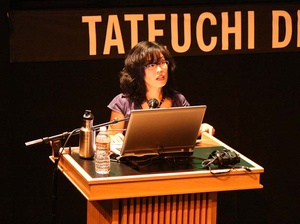
Richard was an extremely private person. Diane expressed that her activist background and understanding had been very helpful in creating that trust between her fellow activist interviewees throughout the process of collecting research for this book. This factor was especially important to Richard, who took a while to “open up and trust, ” Diane said, with his personal memories, photo collections, and the private details of his life.
“It seems like for most people, they would hand over photographs and it wouldn’t be any big deal, but for him, it took a long process to get him to be able to feel comfortable enough to share his photographs with me and to allow me to scan them for the book.”
In Diane’s eyes, this wasn’t just an academic project, but a developing relationship and friendship. Even from the written words from interview excerpts in his biography, you can just imagine, Diane described, “his energy, his charm, his wit.” Diane fondly recalled those interviews where she would “be sitting there cracking up and laughing with him and felt such a sense of honor being able to listen, most extensively, to his stories.” Diane elaborated, “you know, his close friends know him in ways that I don’t know him of course, but I don’t think he’s ever sat and just talked about his life with anybody. In fact, I know he hasn’t.”
What prompted author Diane Fujino’s interest in Richard Aoki were parallels to her own life and her interest in activism. She explained, “as I became more and more interested in social justice struggles, I became more interested in Asian American activism and Japanese American activism and like everyone, I knew very little.” This limited documented part of history also suffers from the absence of biographies of figures from this period, leaving the people of the Asian American Movement without a tangible voice and stories to hold on to. Diane expressed, “while people are documenting organizations, campaigns, the Asian American Movement, what’s very needed still are biographies of individual people, because the public barely knows even one Asian American activist.”
Richard Aoki is an inspirational historic political figure not only for the Japanese American community, but also the broader Asian American community, and greater social and political activist communities. His complex story challenges the stereotypical Japanese American model minority standard as well as incorporates many of the struggles that Japanese Americans and minority races experienced during World War II, the Cold War, the Civil Rights Movement, and onward. He was a leader who was educated in his passions and knew how to rise to the occasion with his militarist, radical approach.
To learn more, please check out Diane Fujino’s book Samurai Among Panthers: Richard Aoki, On Race, Resistance, and a Paradoxical Life in stores and at the Japanese American National Museum.
Diane is currently conducting research regarding Japanese American activism in the post-war period, more specifically, she stated, “the contested nature of citizenship, race, and radical democracy and looking at issues such as the McCarran-Walter Act of 1952.” She wants “to show this kind of complicated history within Japanese America and again, woven through all of this will be a focus on activism to show how Japanese Americans were political, had political agency and we weren’t just victims of state intervention or state laws and that we fought back in many ways as well and we helped to shape our own history.” Her future research focuses on a Japanese American brother-sister team, Mitsuye Yamada and Michael Yasutake, who impacted the Japanese American experience in their own unique ways as a poet and Episcopalian minister, then united in the political prisoner movement.
Addendum:
If you’re from the Bay Area or part of the Japanese American community, you may have read the articles accusing Richard of being an FBI informant. Before you jump to conclusions, have an open mind on this situation. Think about what evidence is held against him, the sources from which that evidence surfaced and the motives that may have been involved. Also, think about the impact that Richard has made on the Asian American Movement, East Bay community, and social and civil rights organizations he has been a part of in the much greater struggle for political justice. I think that the powerful response to the accusations from those who knew and loved him, speak volumes. It’s time that we move forward.
© 2012 Japanese American National Museum


